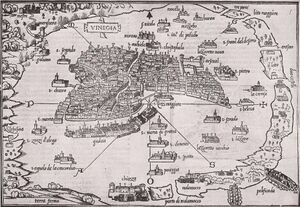Sanudo's Diary: Difference between revisions
No edit summary |
No edit summary |
||
| Line 72: | Line 72: | ||
We identified three APIs which we could use to locate whether an entity exists in Venice or not. These were: Nominatim (OpenStreetMap), WikiData, and Geonames. We settled on Nominatim as the chief API, since it was the easiest to use and offered the most consistent results. Thus, we created a pipeline to extract place entities from the Sanudo's index and use the Nominatim API to search if the entity exists in Venice, and store the co-ordinates if so. | |||
==Results== | ==Results== | ||
Revision as of 13:54, 31 October 2024
Click to go back to Project lists
Our Github Page
Link to Google Doc
Abstract
Introduction
Goal: Present the named entities in diary in an interactive way, e.g. map-based website. georeference the useful name entities with Venice places.
About Sanudo
| Attributes | Data | Remark |
| Status | aristocrat | |
| Occupation | Historian | |
| Content Style |
Sanudo's Diary
The Diaries of Marin Sanudo, composed between 1496 (when Sanudo was 30) and 1533 (just under three years before his death), represent one of the most comprehensive daily records of events ever compiled by a single individual in early modern Europe. The Diaries have become an essential resource for any serious study of Renaissance Venice. They offer insights into various aspects of Venetian life, from "diplomacy to public spectacles, politics to institutional practices, state councils to public opinion, mainland territories to overseas possessions, law enforcement to warfare, the city's landscape to the lives of its inhabitants, and from religious life to fashion, prices, weather, and entertainment".[2] The strengths of his finest works, especially the Diaries and the De origine, situ et magistratibus urbis Venetae, establish Sanudo as the leading Venetian historian of his generation.
Transforming Sanudo’s index (1496 - 1533)
Database: <The Diaries of Marino Sanudo>
| Attributes | Data | Remark |
| Diary Duration | 1496-1533 | 37 |
| Quantity | 58 Volumes | around 40000 pages |
| Content Style |
"...the continuity of events and institutions collapses into the quotidian. ...Unreflecting, pedantic, and insatiable, he aimed "to seek out every occurrence, no matter how slight," for he believed that the truth of events could only be grasped through an abundance of facts. 18 He gathered those facts in the chancellery of the Ducal Palace and in the streets of the city, transcribing official legislation and ambassadorial dispatches, reporting popular opinion and Rialto gossip"[1]
Deliverables
Project Timeline & Milestones
Team Journal
- 2024/10/10:
- Background Information research, project goal clarification.Outcome: Found and went through a related comment article [1]. Get an understnnding of the Sanudo's diary. Clarified some points:
- - Initial goal: obtain diary text and extract place names.
- - Next tasks:
- - Match person names with place names.
- - Link named entities to specific diary content.
- - Integrate everything into the map frontend.
- - For the interactive part: We will be able to use the Venice interactive map frontend previously demonstrated by the professor.
Project Process
We identified three APIs which we could use to locate whether an entity exists in Venice or not. These were: Nominatim (OpenStreetMap), WikiData, and Geonames. We settled on Nominatim as the chief API, since it was the easiest to use and offered the most consistent results. Thus, we created a pipeline to extract place entities from the Sanudo's index and use the Nominatim API to search if the entity exists in Venice, and store the co-ordinates if so.
Results
Conclusion
Appendix
References
Frontend references:
https://pov-dev.up.railway.app/ (development version)
https://pov.up.railway.app/
Document references:
[1] Finlay, Robert. “Politics and History in the Diary of Marino Sanuto.” Renaissance Quarterly, vol. 33, no. 4, 1980, pp. 585–98. JSTOR, https://doi.org/10.2307/2860688. Accessed 10 Oct. 2024.
[2]Image source: https://evolution.veniceprojectcenter.org/evolution.html
[3]Ferguson, Ronnie. “The Tax Return (1515) of Marin Sanudo: Fiscality, Family, and Language in Renaissance Venice.” Italian Studies 79, no. 2 (2024): 137–54. doi:10.1080/00751634.2024.2348379.
